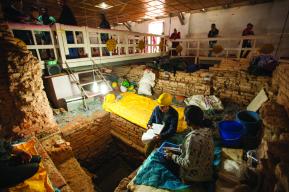"When I hear people referring to me as a terrorist or instructing me to go to my place of origin, I experience a deep sense of vulnerability and helplessness. I often feel like I am out of place in my own country", confesses an unnamed international relations student at Tribhuvan University in Nepal, who regularly experiences hate speech. Being from a Muslim minority in their country, they frequently hear derogatory remarks that label them based on their religion and ethnic origin.
This student is not the only one who is being targeted with hate speech. In South Asia, it has become more prevalent, visible, and harmful. Fuelled by the spread of mis- and disinformation, political polarization, socioeconomic inequalities, and lack of social justice, it can range from offensive comments and harmful stereotyping to explicit calls for violence against a specific person or a group. Its main aim is to compromise their dignity – simply because of who they are. Religion, ethnicity, nationality, race, gender, and other identities are only some of the grounds used to single out and exclude. Online and offline, hate speech creates toxic environments, causes psychological harm, reinforces division, and sometimes escalates to violence.
In June 2023, UNESCO gathered experts, educators, activists, policy-makers, representatives of digital platforms and youth from across South Asia in Kathmandu, Nepal, to discuss comprehensive solutions that would effectively support those dealing with hate speech in the region. Such approaches could combine all or several elements mentioned below to minimize the harmful effects of hate speech and prevent its dissemination.
A comprehensive response to hate speech: what does it look like?
Legal measures
Laws that protect against hate speech must consider freedom of expression as defined under international human rights standards. Yet, striking this balance remains one of the fundamental challenges. "There is no common universal definition of hate speech, and it means that the concept can be divisive, emotionally charged, controversial, or disputed", explains Dr Cynthia Miller-Idriss, professor at the American University in Washington DC, USA.
Education
Schools and universities are where children and young people socialize, learn to deal with information, resolve conflicts and embrace each other's differences. However, narratives that fuel hate speech and justify exclusion can be found across subjects and educational programmes. Parents and teachers may not be free from their prejudice and bias, too.
That's why a strong focus of the discussion was that reviewing education – in its entirety– matters to address hate speech. It is needed to identify problematic narratives, build a healthy school climate and ensure that learners have the necessary skills and knowledge to protect themselves and engage with others ethically and respectfully. UNESCO’s new policy guide "Addressing hate speech through Education", co-developed with the United Nations Office on Genocide Prevention and the Responsibility to Protect (UNOSAPG), provides recommendations on curricula and relevant teaching approaches.
Political commitment
Decisions about the content and context of learning are implemented by educators but made by policy-makers. Thus, participants agreed that securing their support is paramount to any success in countering hate speech. Curbing its spread and disseminating principles from the new UNESCO guide was mentioned as a priority at the highest policy level by Ashok Kumar Rai, Minister of Education, Science and Technology of Nepal; A. Aravindh Kumar, the State Minister of Education from Sri Lanka, and Fathimath Naseer, the Minister of State for Education from the Maldives. Country representatives participating in the consultations made commitments to further develop and implement their national action plans against hate speech that were enriched as a result of the event
Youth engagement
Himanshu Panday, Co-founder of Dignity in Difference, India, emphasized the importance of understanding the cultural context when addressing hate speech and treating learners as co-creators and not just subjects of the education process. " It is necessary that young people become an essential part of this participatory process and have the agency to make certain choices."
Dialogue with digital platforms
As the Internet and social media expansion adds up to the virulence of hate speech and accelerates its spread, dialogue with digital platforms on these issues, including increasing their transparency and improving their content moderation policies, is part of the solution. UNESCO has been leading and encouraging consultations on the new guidelines for digital platforms as a follow-up to its recent #Internet4Trust Global Conference. The meeting in Nepal fits in the regional dimension to this work.
Importance of partnerships
Septiaji Eko Nugroho, activist and chairman of Mafindo, an Indonesia-based fact-checking organization, provided an example of constructive collaboration between different stakeholders – digital platforms, the education sector, civil society and policy-makers. Mafindo is part of the Damai Coalition, supported by UNESCO's Social Media 4 Peace program, that proposes practical measures to combat hate speech and misinformation to digital platforms and the government.
We organize training and fact-checking activities and provide various accessible resources. Our coalition is involved in including digital citizenship in the national curriculum. We want to introduce digital ethics and culture to students as early as elementary schools and create digital well-being guidelines for parents and teachers.
UNESCO's action to address hate speech
The Kathmandu meeting continues the efforts UNESCO has been undertaking since 2021 to bring the problem of hate speech to the fore, mobilize political support and implement the UN Strategy and Plan of Action for Hate Speech. More regional consultations are foreseen for 2023 and 2024. UNESCO will further collaborate with Member States on the realization of their national action plans. Learn more about this work.









